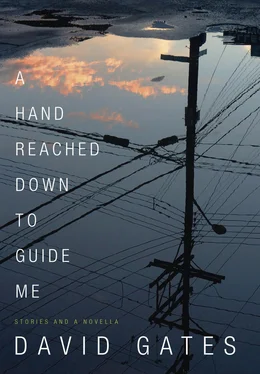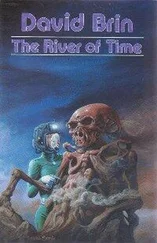David Gates - A Hand Reached Down to Guide Me
Здесь есть возможность читать онлайн «David Gates - A Hand Reached Down to Guide Me» весь текст электронной книги совершенно бесплатно (целиком полную версию без сокращений). В некоторых случаях можно слушать аудио, скачать через торрент в формате fb2 и присутствует краткое содержание. Жанр: Современная проза, на английском языке. Описание произведения, (предисловие) а так же отзывы посетителей доступны на портале библиотеки ЛибКат.
- Название:A Hand Reached Down to Guide Me
- Автор:
- Жанр:
- Год:неизвестен
- ISBN:нет данных
- Рейтинг книги:5 / 5. Голосов: 1
-
Избранное:Добавить в избранное
- Отзывы:
-
Ваша оценка:
- 100
- 1
- 2
- 3
- 4
- 5
A Hand Reached Down to Guide Me: краткое содержание, описание и аннотация
Предлагаем к чтению аннотацию, описание, краткое содержание или предисловие (зависит от того, что написал сам автор книги «A Hand Reached Down to Guide Me»). Если вы не нашли необходимую информацию о книге — напишите в комментариях, мы постараемся отыскать её.
magazine anointed “a true heir to both Raymond Carver and John Cheever.”
A Hand Reached Down to Guide Me Relentlessly inventive, alternately hilarious and tragic, always moving, this book proves yet again that Gates is one of our most talented, witty and emotionally intelligent writers.
A Hand Reached Down to Guide Me — читать онлайн бесплатно полную книгу (весь текст) целиком
Ниже представлен текст книги, разбитый по страницам. Система сохранения места последней прочитанной страницы, позволяет с удобством читать онлайн бесплатно книгу «A Hand Reached Down to Guide Me», без необходимости каждый раз заново искать на чём Вы остановились. Поставьте закладку, и сможете в любой момент перейти на страницу, на которой закончили чтение.
Интервал:
Закладка:
A couple of years later, Paul brought me into his band when their lead singer moved to California, and we also played some coffeehouses as a duet, calling ourselves the Twofer Brothers. I went to the University of Connecticut for graduate school but drove down to the city a couple of times a month, and every so often Paul would put the band back together for some party where they’d pile hay bales around the room. After these gigs we’d go up to his place, get high and listen to music, or drink and talk books. He told me he loved “Jimmy Hank,” and gave me a copy of The Ambassadors from his collection of pristine old Signet paperbacks; it had a price of fifty cents. By then I’d decided to specialize in the nineteenth century, and I resented Jimmy Hank for his review of Our Mutual Friend —“poor with the poverty not of momentary embarrassment, but of permanent exhaustion.” I’ve still got that book: the cover illustration shows a top-hatted gent seen from behind in a café chair, with wineglass and cane. I suppose it’ll be on my shelves, still unread, when I die.
While I was finishing my dissertation, I got married to the first woman I’d ever lasted with for more than a month. Diane, I might as well admit, was my student when I was a TA, and why bother trying to extenuate it, all these years later, by telling you that we started sleeping together only after the semester was over? Or that in our History of Us conversations, we could never decide who’d made the first move? She’d go to festivals and parties with me to be the cool girlfriend with the cutoff jeans, and we promised each other that once we got out of married-student housing we’d live in the country somewhere, in a house full of books, no TV, and raise our own food.
I’d grown up in Park Slope, but my father was an old folkie—he used to hang around Washington Square in the fifties—and when I was twelve or thirteen I began listening to his LPs and fixating on the photos of ruined grampaws on their falling-down porches; even the mean, sad bluegrass guys in business suits and Stetsons, holding thousands of dollars’ worth of Martins and Gibsons, had been posed by abandoned shacks in the mountains. Everybody in our little scene thought of himself as a secret country boy. My old banjo player, the one I rode up to Roxbury with, quit his teaching job and moved to the Northeast Kingdom, where I hear he makes B-string benders in his machine shop and plays pedal steel in a country band. Our bass player left the East Village for Toast, North Carolina, to sit at the feet of Tommy Jarrell. Even my father, in his bourgie-folkie fashion. He was an engineer at Con Edison for thirty years; when he retired, he and my mother built a solar house up near Woodstock.
I found a teaching job at a small college in New Hampshire, and Diane got accepted at the New England Culinary Institute. We bought a fixer-upper farmhouse on a dirt road, with a woodstove, a barn and twenty acres, equally inconvenient to my school and hers. I put a metal roof on the old henhouse—Diane had always wanted to keep chickens—rototilled our garden patch every spring and bought a chainsaw and a splitter, as well as a rusty Ford 8N, the pretext being that we needed to keep the fields from growing back to brush. Our neighbor, a man in his seventies, kept the thing going for me; he liked us because I was so helpless and Diane was so pretty. In the spring he and I would work up the next winter’s wood together, sharing my splitter and running his buzz saw off the tractor’s PTO. I don’t know how I did all this while teaching three and three and working on my book; when the old man finally went into a home I started buying cordwood. My parents drove up a couple of times a year, and my father always brought his single-O Martin, the guitar on which he taught me my first chords. He and I would sit around playing the half-dozen fingerpicking songs—“Lewis Collins,” “Spike Driver’s Moan”—that he’d never cared to get beyond. They seldom stayed more than a day or two. The woodstove didn’t keep the guest room warm enough in fall or winter, and my mother got bitten to death by mosquitoes in the summer.
Every July Diane and I threw an outdoor music party and pig roast; she’d cook the whole week before, and her friends from Boston and my friends from New York brought tents and sleeping bags and tried to dance to the ad hoc bands that formed in the corners of the field behind the house. Paul Thompson always turned up with his mandolin, some good weed and a younger woman, never the same one twice.
For a few years, he’d drive that summer’s woman to catch a bus in White River Junction and stay on until Tuesday or Wednesday. Diane liked him—what woman didn’t, at first?—and he was no trouble to have around. He took walks in the woods by himself, spent hours reading in the hammock on the porch and didn’t mind when we went up to bed and left him downstairs with his weed and his headphones. “A man could die happy up here,” he used to say. He told me he liked hearing the rooster at first light, because it made him feel safe to go back to sleep. When he finally got up, he’d go out to the henhouse, gather eggs and cook his own breakfast—and clean up afterward. Diane usually picked eggs early in the morning, but she’d leave a couple for him to find. Once, when he’d been out there for what seemed like a long time, I went to check and saw him through the window, squatting on his hams, his cowboy boots the only part of him touching the floor. He was talking and nodding to himself, or to the hens, who came right up to him as they never did for me. I sneaked back to the house and I didn’t think he heard me.
But most of the time, Paul wasn’t anybody I thought about much, though I know now that he was thinking about me.
—
For whatever reason, I never wanted children. Not a crime against humanity—arguably quite the opposite—but of course this became an issue when Diane turned thirty. That and suspicions about me and my students, which I should’ve seen coming as well, and about one student in particular. (The wrong one, as it happened.)
Diane and I lasted ten years, and after she left I drank myself to sleep every night for a month. She’s remarried now, has her own catering business, and her older daughter’s applying to colleges—better schools than the one where I teach. We’re on good enough terms these days that she sends me pictures. At the time of the divorce, though, she held out for money in return for her share in the house, and I had no prospect of a better-paying job. My book, Cathy’s Caliban: Sex, Race and the Sublime in “ Wuthering Heights ”—a rewrite of my dissertation—got only one notice, in Victorian Studies , whose reviewer (from some other no-name college, in Missouri) called it “by turns perverse and pedestrian.” The book got me tenure, since nobody else in the department had published a word in the past ten years, but only a two-thousand-dollar raise. So I went back to working up my own wood until—God, must we? Until I was able to sell my father’s house.
Diane had already left the last time he came up, the fall after my mother died. He had his Martin with him, as usual, but didn’t feel like playing. Could he leave it with me? The strings felt stiff, so maybe I could take it to the guy who worked on my guitar. It didn’t feel any different to me, but I told him I’d see if Brad could bring the action down a little. Hell, I thought, he’s seventy-eight, his fingers might not be as strong as they used to be.
I set the chessboard up on the wooden factory spool Diane and I had used for a coffee table—he mostly kicked my ass—and poured glasses of the Bushmills he always brought. While I was considering whether or not to move a rook, he picked up a photo from the table beside the sofa: Diane and I sitting at a café in Lisbon, the one time we went to Europe.
Читать дальшеИнтервал:
Закладка:
Похожие книги на «A Hand Reached Down to Guide Me»
Представляем Вашему вниманию похожие книги на «A Hand Reached Down to Guide Me» списком для выбора. Мы отобрали схожую по названию и смыслу литературу в надежде предоставить читателям больше вариантов отыскать новые, интересные, ещё непрочитанные произведения.
Обсуждение, отзывы о книге «A Hand Reached Down to Guide Me» и просто собственные мнения читателей. Оставьте ваши комментарии, напишите, что Вы думаете о произведении, его смысле или главных героях. Укажите что конкретно понравилось, а что нет, и почему Вы так считаете.











